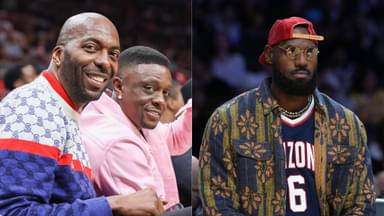Nothing is ever certain in life or in the NBA. What could seem like a great situation could, in fact, be a horrible one. Former NBA player John Salley’s decision to sign with the Toronto Raptors ahead of their inaugural season seemed like a great opportunity but didn’t go as planned. Now with the gift of hindsight, Salley looks back at the situation with controversial lens.
Advertisement
Following Salley’s first six seasons with the Detroit Pistons, he joined the Miami Heat for three years. He became a free agent ahead of the 1995-96 season. During this time, his former teammate and close friend, Isiah Thomas, was the executive of the expansion Toronto Raptors. Salley felt that reuniting with Thomas was the right move.
That partnership, however, only lasted two months before they parted ways. Unlike typical buyouts in today’s NBA, Salley’s was a bit different.
“I bought my rights back,” Salley revealed on The Rich Eisen Show. “So I had my waivers, and I could choose where I wanted to go.”
Players don’t usually go into their pockets to buy their rights to their waivers. Although it didn’t work in Toronto, Salley’s relationship with Thomas was still strong, leading the executive to grant him that freedom.
Unfortunately, Salley believes his situation warranted an irregular analogy to be understood“This may be controversial, but I was the only free slave in the NBA,” he proclaimed.
What could Salley mean by free slave in the NBA? The free part correlates to his ability to sign willingly to any team of his choosing. The slave aspect is possibly due to him still being under the umbrella of the NBA.
Considering Salley’s body of work and skill set, plenty of contending teams came knocking at the door. Interestingly, he decided to sign with a former arch-rival. “When Jerry Krauss called, I said, ‘Yes,'” Salley said.
The former Bad Boy Pistons member signed with the Chicago Bulls, only appearing in just 17 games. But that doesn’t take into consideration the impact he had behind the scenes. That was a special year for Salley as he helped contribute to Chicago’s iconic 72-10 season.
Salley’s claim certainly could cause some controversy but we may never see a player own their waiver rights in the NBA ever again since contracts are so lucrative. It’s unlikely that any player in 2025 would be willing to spend such a large amount of money to free themselves from a deal.






